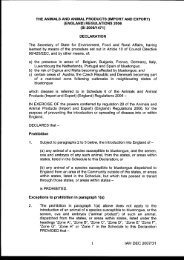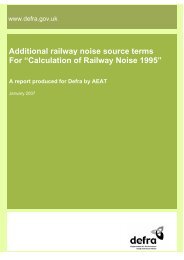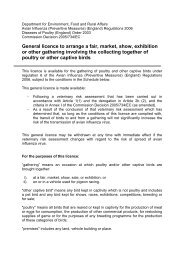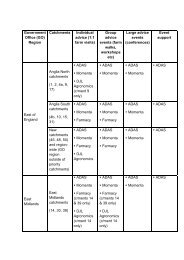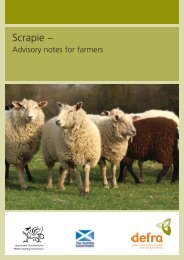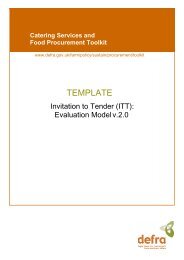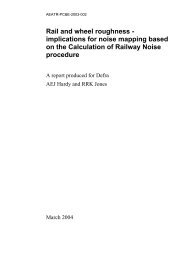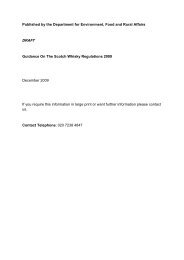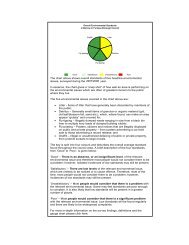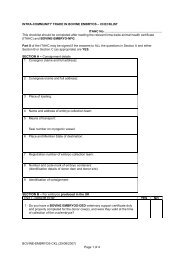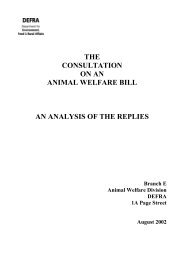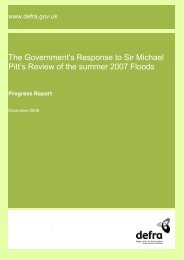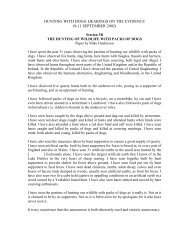Review of the Food-borne Zoonoses Research ... - ARCHIVE: Defra
Review of the Food-borne Zoonoses Research ... - ARCHIVE: Defra
Review of the Food-borne Zoonoses Research ... - ARCHIVE: Defra
Create successful ePaper yourself
Turn your PDF publications into a flip-book with our unique Google optimized e-Paper software.
Project code: OZ0326<br />
Project title: Managing <strong>the</strong> challenges to <strong>the</strong> egg industry posed<br />
by new SE PTs<br />
Start date (dd/mm/yy): 01/04/06<br />
End date (dd/mm/yy): 31/03/09<br />
Total cost:<br />
£403,472.00<br />
Affiliation: University <strong>of</strong> Bristol<br />
Sub-contractor(s): VLA<br />
Abstract <strong>of</strong> research<br />
Salmonella spp. are highly important zoonotic pathogens causing over one billion cases<br />
<strong>of</strong> infection worldwide each year. One Salmonella serovar, in particular, is most<br />
important. For <strong>the</strong> last 20 years <strong>the</strong>re has been a pandemic <strong>of</strong> Salmonella Enteritidis<br />
(SE) infection in almost all parts <strong>of</strong> <strong>the</strong> world, including Europe and this has largely been<br />
egg-associated. The pandemic continues and SE remains a highly important zoonotic<br />
pathogen. The longevity <strong>of</strong> <strong>the</strong> pandemic is unique and is associated with <strong>the</strong> invasive<br />
behaviour <strong>of</strong> SE in chickens and <strong>the</strong> fact that infection in laying hens is largely subclinical.<br />
The pandemic does have dynamic aspects, however, and <strong>the</strong> last few years <strong>the</strong><br />
UK, and some o<strong>the</strong>r EU member states, has seen a marked shift in phage types <strong>of</strong> SE<br />
from human cases. Prior to this, one PT, PT4 dominated <strong>the</strong> epidemiological picture in<br />
Western Europe. More outbreaks in <strong>the</strong> UK are now caused by PTs o<strong>the</strong>r than 4. For<br />
example, PT 1 has risen from c.850 cases in 1999 to c.2000 in 2003. Similarly, cases<br />
caused by PT 14b rose from c.150 to c.950 in <strong>the</strong> same period. The new PTs may<br />
become established in <strong>the</strong> UK and it is important to establish <strong>the</strong> risk posed by <strong>the</strong>se new<br />
and potentially highly dangerous PTs, which threaten animal and public health in <strong>the</strong> UK.<br />
Changes in Salmonella type, as manifested by PT alterations, occur with high frequency<br />
and must challenge control measures put in place to deal with different strains.<br />
The research is identifying how a range <strong>of</strong> relevant SE PTs differ in surface structures,<br />
particularly LPS, and how <strong>the</strong>se changes influence <strong>the</strong> growth and survival <strong>of</strong> <strong>the</strong><br />
bacteria in whole eggs and egg components. The work will also encompass interaction <strong>of</strong><br />
SE PTs with immune sera from vaccinated hens and infection biology in immunised (with<br />
PT4) and non-immune hens. Identification <strong>of</strong> surface structures and how <strong>the</strong>se affect<br />
virulence will eventually enable improved vaccines to be produced. The investigators are<br />
already interacting with vaccine companies.<br />
<strong>Review</strong> Summary<br />
Understanding differences between phage types <strong>of</strong> S. Enteriditis was considered<br />
important, particularly if it shed light on understanding <strong>the</strong> risk to public health associated<br />
with table eggs. Vaccination <strong>of</strong> poultry with a vaccine based on phage type 4 has been a<br />
significant plank in <strong>the</strong> control <strong>of</strong> S. Enteritidis in <strong>the</strong> UK and it was important to establish<br />
53



